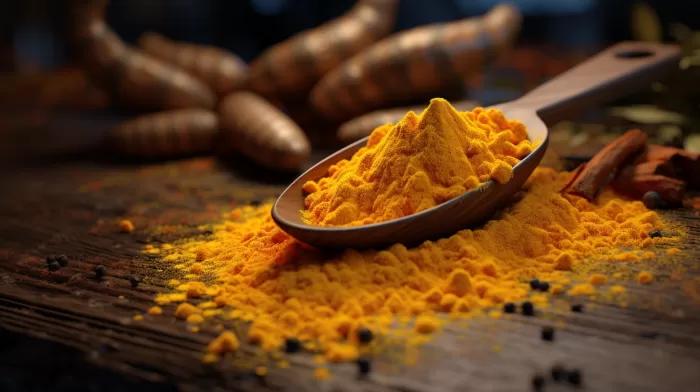One common misconception is that Alzheimer’s disease is not treatable. However, if diagnosed early enough, medications and lifestyle adjustments can slow or delay its progression, particularly during the earliest stages. In fact, taking prompt and proactive steps, especially if you have a family history of the condition or consider yourself at risk, can help preserve your memory for a decade or more.
That being said, there’s a spice that seems to carry significant potential in the fight against Alzheimer’s: curcumin, found primarily in turmeric.
Curcumin and its Potential Impact on Alzheimer’s Disease
Curcumin’s potential for combating Alzheimer’s disease has been gaining attention from researchers for several reasons. One is its demonstrated benefits in the treatment of dementia and traumatic brain injury. Additionally, Alzheimer’s disease prevalence among the Indian population—where turmeric is used extensively in both food and medicine—is significantly lower than among other populations worldwide.
According to statistics, the prevalence of Alzheimer’s among Indian adults aged 70 to 79 is 4.4 times lower than that of their same-age peers in the United States. One of the factors contributing to this difference is the higher consumption of curries and turmeric-based foods in India.
Curcumin is a potent antioxidant with anti-inflammatory and lipophilic (fat-soluble) properties. Its lipophilic activity allows it to pass through the blood-brain barrier and potentially improve cognitive function in Alzheimer’s patients. The compound has been shown to decrease levels of protein fragments called beta-amyloid plaques—a signature feature of Alzheimer’s disease. Curcumin’s ability to cross the blood-brain barrier means it can attach to plaques and help eliminate them.
Moreover, it can help delay the destruction of brain cells (neurons), eliminate heavy metals that may contribute to dementia, fight inflammation, and reduce microglia formation, the primary immune cells of the central nervous system.
Research on Curcumin for Alzheimer’s
A study conducted at the University of California Los Angeles showed that curcumin could clear amyloid plaques by supporting macrophage activity—cells that help the body eliminate foreign proteins. Alzheimer’s patients treated with curcumin demonstrated an improvement in plaque elimination compared to those who didn’t receive the treatment.
Curcumin’s anti-inflammatory properties can also help address chronic inflammation of nerve cells, another characteristic of Alzheimer’s disease. Several studies have shown curcumin’s anti-inflammatory activity, leading experts to note that it may contribute to an Alzheimer’s cure.
Research also indicates that curcumin can help eliminate heavy metals, which can induce the accumulation and toxicity of beta amyloids and concentrate in the brain. Animal studies suggest that curcumin can reduce neuronal damage caused by heavy metals like lead, copper, zinc, and iron.
Another way curcumin can potentially help combat Alzheimer’s is its ability to inhibit cholesterol formation, as elevated blood cholesterol and high-fat diets are associated with increased amyloid plaques. Current research concludes that curcumin has significant potential as a treatment for Alzheimer’s disease and may ultimately lead to the development of improved drugs based on the compound.
How to Take Curcumin
For Alzheimer’s patients, the recommended curcumin intake is 2 to 3 grams daily, divided into two to four doses. However, the body poorly absorbs curcumin, so certain measures can increase its bioavailability.
In supplement form, curcumin should be taken along with black pepper (piperine) or a substance like soy lecithin, both of which significantly enhance bioavailability. Meriva, a patented form of curcumin, has also shown improved bioavailability. To further increase curcumin absorption through food, it should be heated or consumed with healthy fats like avocado, olive oil, or coconut oil.



